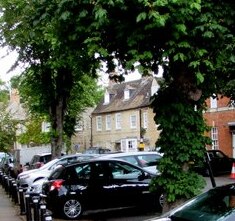Henrietta Barnett (WRAF officer) facts for kids
Quick facts for kids
Dame Henrietta Barnett
|
|
|---|---|
| Birth name | Mary Henrietta Barnett |
| Born | 16 February 1905 Winchester, Hampshire, England |
| Died | 11 September 1985 (aged 80) Oxfordshire, England |
| Allegiance | United Kingdom |
| Service/ |
Auxiliary Territorial Service (1938–1939) Women's Auxiliary Air Force (1939–1949) Women's Royal Air Force (1949–1960) |
| Years of service | 1938–1960 |
| Rank | Air Commandant |
| Battles/wars | Second World War Cold War |
Dame Mary Henrietta Barnett was a very important leader in the Women's Royal Air Force (WRAF). She was born on February 16, 1905, and passed away on September 11, 1985. From 1956 to 1960, she held the top position as the Director of the WRAF.
Contents
Growing Up and School
Mary Henrietta Barnett was born in Winchester, England, on February 16, 1905. She was the youngest child of Colonel George Henry Barnett and Mary Dorothea Barnett. From 1918 to 1922, she went to Heathfield School. This was a private school just for girls in Ascot, Berkshire.
Her Military Journey
In 1938, Barnett joined the Auxiliary Territorial Service as a volunteer. This was a group for women who wanted to help the army. She was part of the No. 45 County of Oxford Company.
Joining the WAAF
When the Women's Auxiliary Air Force (WAAF) was created in June 1939, she moved to that service. She became an officer, which meant she was given a special role. Her rank was like a pilot officer in the Royal Air Force.
During World War II, she worked at different Royal Air Force (RAF) bases. These included RAF Upper Heyford and RAF Feltwell. She also worked at the Air Ministry in London.
During the London Blitz
Barnett was in London during the London Blitz. This was a time when German planes bombed London heavily. She saw famous buildings like the House of Commons get damaged.
She said that the women working with her were very brave. "Never once did they speak of their secret work," she noted. "Seldom were they late for duty, even after a raid. They were known as the Whitehall Warriors."
After the War
After World War II ended in 1945, Barnett was sent to Italy. She worked for the RAF Mediterranean Command. Her job was to look after all the WAAF staff in that area. She even traveled to Vienna to see if women could be stationed there.
In October 1947, she came back to the United Kingdom. She became a WAAF staff officer at RAF Flying Training Command. In 1948, she was made the WAAF Inspector. This meant she traveled a lot to check on WAAF personnel at different bases.
Leading the WRAF
In 1949, the Women's Royal Air Force (WRAF) was formed. Barnett became a group officer in the WRAF. This rank was similar to a group captain in the RAF.
From 1949 to 1952, she was one of two Deputy-Directors of the WRAF. She was in charge of choosing, promoting, and helping WRAF officers. In 1952, she became the Commanding Officer of RAF Hawkinge. This made her the only female station commander in the RAF.
From 1956 to 1960, she reached the highest position. She served as the Director of the Women's Royal Air Force. Her rank was Air Commandant, which is like an air commodore. During this time, she also worked as an aide-de-camp for the Queen. This is a special helper role.
Life After the Military
In March 1960, Barnett retired from the WRAF. She moved to a small house in Woodstock, Oxfordshire. She stayed connected with the WRAF. She was the head of the WRAF Officers' Association's executive committee.
She was also active in her local community. She served as the mayor of Woodstock from 1968 to 1969. Dame Mary Henrietta Barnett passed away at her home on September 11, 1985, at the age of 80.
Awards and Recognition
Barnett received several important honors for her service.
- In 1956, she was made a Commander of the Order of the British Empire (CBE).
- In 1958, she was promoted to Dame Commander of the Order of the British Empire (DBE). This honor gave her the title Dame.
 | James Van Der Zee |
 | Alma Thomas |
 | Ellis Wilson |
 | Margaret Taylor-Burroughs |


